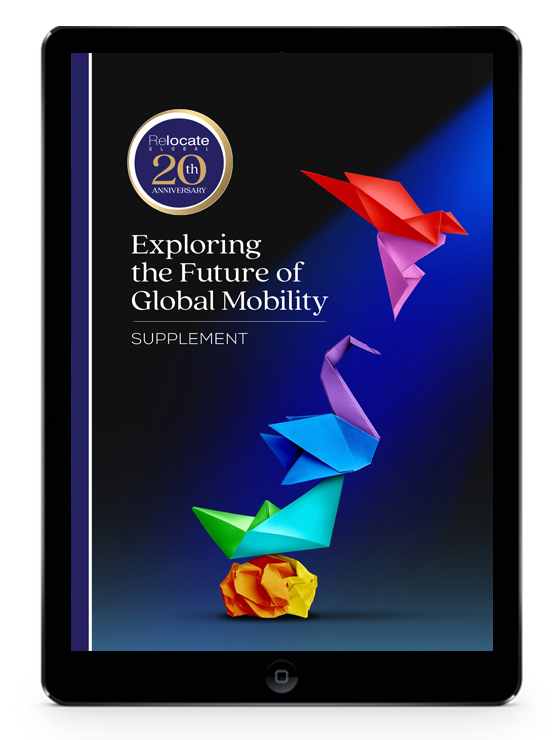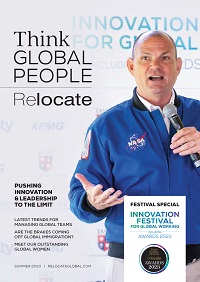How to manage your employer’s Duty of Care in a rapidly changing global environment
There are growing threats to employees working abroad and travelling on business trips, from industrial espionage, terrorism and civil unrest. At the same time companies are trying to widen the scope of people they send on assignments in order to fulfil their DE&I objectives.
How should an employer discharge their duty of care without trampling across the private life and personal freedom of their employees? We talk to Richard Harris-Deans, partner and director of advisory at CHC Global, an expert on travel risk management and employer’s Duty of Care.
Business travel is starting to rebound after Covid, and companies are now sending staff on assignment to emerging and frontier markets in the search of new global opportunities. While oil and gas companies have long been at the forefront of managing staff in hardship locations, organisations with less “frontier experience” are beginning to consider sending assignees to what might previously have been considered challenging or “hardship” locations.
For example, parts of West Africa, the Gulf of Guinea and Nigeria are a growth market for many sectors, but there is a growing threat of kidnap and ransom, as well as an increase in terrorism in those regions. Even in relatively ‘safe’ locations in Europe, travellers face the threat of low level and opportunistic crime.
Then there is the issue of keeping employees safe without requiring them to disclose private or personal information which might be compromise their security. With more globally mobile employees, there is a growing awareness that what might not be an ED&I issue for a member of staff in one part of the world might be a serious consideration for someone working in a very different culture or location.
Different employees also have backgrounds which may place them at more or at less risk in certain jurisdictions or geographies. Employers have a duty of care to all employees, and this includes considering assignments or work placements where their gender, sexuality, race, or opinions might put them in danger. Broaching the subject of personal safety, gender, political opinions, race or sexual preference with an employee can, however, be very difficult to navigate. Employers need to strike the right balance between respecting employees’ privacy and ensuring that they carry out the proper duty of care.
This article is taken from the latest issue of Think Global People magazine. Click on the cover to access the digital edition.
The growing trend of civil unrest on a global scale and what it means for employers
“Over the last 10 years there have been much higher levels of insured losses from civil unrest and rioting than there have been from terrorism,” says Richard Harris-Deans, partner and director of advisory at CHC Global.
CHC Global are risk advisors for organisations and professionals working in global mobility. Richard’s expertise is in analysing strategic security issues, including advising clients on their exposure to terrorism and political violence. Prior to joining CHC Global, Richard spent 13 years working for the British Government at the Ministry of Defence and the Foreign and Commonwealth Office. He focussed on national security issues including geopolitical developments and strategic threats, including terrorism, nuclear proliferation, and the actions of hostile nation states.
“The drivers of this global unrest are all the things that we are seeing in UK but magnified in other in other markets,” he says. “Falling living standards, rising inflation, particularly in emerging markets, weakening currencies, and people having to pay more for their food and energy imports.
“All of these things are putting a lot of pressure on various countries. In countries where the government might have a lack of legitimacy or there is a feeling among the population that the government is not really invested in its voters’ wellbeing, those things can make quite a combustible mix.”
He says that this unrest is no longer confined to emerging markets but has much wider implications across the globe.
“If you look at some of the protests in the United States over the last couple of years, you can see this is often associated with election cycles. It is global problem, and one which companies need to be aware of.”

Competition between powerful nations has serious implications for business
Another key trend that is emerging is strategic competition, that is, tension between great national powers. The war between Russia and Ukraine has had a profound global impact on relationships between Russia and Europe and on world energy prices and global trade. Tensions between the US and China are also causing issues for businesses in many geographies and industries.
“We thought we had consigned these tensions to the Cold War but they have come back with a vengeance,” Richard says. “Competition between the US and China in particular has a capability to affect almost everything. It is not just a niche, diplomatic subject of interest. It raises issues around our ability to access key technologies. There is a 24-month waiting list on some vehicles because of the tightening of supply chains which was mostly driven by COVID, but this could get even worse if we see the uncoupling of US and Chinese supply chains. If China were to invade Taiwan, the effects would be extraordinary in terms of the impact on global GDP.”
A major concern to corporates is managing their investment abroad, and the risk of expropriation of assets, he says.
“A number of relatively radical left- wing governments that are in and out of power in some parts of the world have taken a quite a punchy view of wealth redistribution and how they manage natural resources in particular. That is now more of a concern now in Colombia, for example, whereas in the 1990s there was potentially a greater risk of kidnap and ransom there.”
The other consideration for global HR managers is the threat of terrorism. Richard says that unfortunately there has not really been any sort of “peace dividend” in the field of terror attacks.
“It would be tempting to think that with the UK’s withdrawal from Afghanistan, and the decline of Islamic State in Syria and Iraq, that terrorism in some respects is receding,” he says. “Sadly that doesn’t appear to be the case, particularly if you look at central and west Africa where Islamic State and the
Al-Qaeda franchise is growing at an extraordinary rate. The idea that we can discount terrorism as yesterday’s problem is not plausible.”
Although kidnap and ransom remain low frequency events and rarely affect Western business travellers and tourists, if an incident does occur it can have a high impact on the individuals and families involved. No employer would want to be involved in a hostage or ransom situation with an untested travel insurance policy.
Richard says companies should have a clearly-defined travel risk management programme in place, led by HR and involving the security team. It should cover five stages: establishing the programme, pretravel risk assessment, traveller preparation, monitoring and communication during travel, and response in case of incidents or emergencies.
He says the “best in class” approach for global mobility team managers and HR teams is to have a travel risk management programme which assesses the risk, prepares travellers and is able to respond when necessary, all within a clear commitment to duty of care.
“Your duty of care commitment starts at the moment you employ someone,” he says. “It is about making sure that when something goes wrong, and it will go wrong, because that is how the world is, that you are well placed to respond and stop an incident turning into a crisis.”
He says managers need to think about the insurance that the company purchase for its mobile staff. Does it cover all the right things? If you have to call on that policy, will it deliver? Simply purchasing the policy alone is not enough, you need to understand how that policy will perform at the point you need it.
How should companies deal with serious incidents abroad involving their staff?
Malicious detention, such as being arrested by foreign authorities on fabricated or minor charges, poses significant challenges for companies. In cases like these, the company’s ability to assist is limited, and consular assistance becomes crucial. Companies may focus on supporting the family and engaging with relevant governments rather than directly resolving the situation.
One emerging issue is that individuals who are nationals of a country, or who have dual nationality, are increasingly at risk of random or malicious detentions in certain jurisdictions such as China and Iran. This means that companies need to think about the risk of whether or not to send certain staff to specific locations, even though they would be ideal in terms of seniority and being fluent in the local language.
In fact, Richard says risk assessments should go beyond destination-focused evaluations and consider traveller profiles. Factors such as dual nationality, sector-specific risks (e.g., technology, pharmaceuticals), and personal characteristics (e.g., same-sex relationships, lone female travellers) should be assessed to ensure comprehensive risk management and take the personal profile of the traveller into account. For managers it can be challenging to strike the right balance between protecting the travellers and respecting their privacy.
“If you work in some sectors which are now considered strategically important and linked to national security, such technology, pharmaceuticals and artificial intelligence, the risk is higher,” he says. “These are the friction points between predominantly US and China but also other countries where your executives have access to really interesting intellectual property. Or they may be working in a sector in which both sides are trying to gain market share.”
He says that unfortunately, executives can unwittingly become pawns in a power game between two countries and their detention is often due to a wider geopolitical issue. This means you need to think very carefully about whom you send abroad.
“Historically, if you wanted to gain market share in China or set up a new office, you might use a Chinese national at senior level in the company who speaks Mandarin and knows the product really well,” he says. “On paper, this seems like the ideal person to send, but nationals and people with dual nationality can be at greater risk. It is important to consider their profile, what sort of technology they are carrying with them, and how you manage the risk of them travelling to that location and the risk of information being stolen.”
How to manage tricky conversations about risk, lifestyle and DE&I
Many companies are commendably trying to send a wider range of assignees on foreign assignments. This might involve considering staff with a variety of different profiles, preferences, health needs and backgrounds. With a wider range of issues comes the need for additional support, whether that is around mobility, health or security.
Richard says there are practical considerations which have to be handled carefully in order to avoid forcing staff to disclose personal information, while also being under a professional obligation to keep them safe.
“Your duty of care commitment starts at the moment you employ someone. It is about making sure that when something goes wrong, and it will go wrong, because that is how the world is, that you are well placed to respond and stop an incident turning into a crisis.”
Rechard Harris-Deans, CHC Global
An example might be the risk of exposing a pregnant woman to the Zika virus. A female member of staff might not want to share this personal information with the employer, especially early in the pregnancy.
Or a member of staff in a same-sex relationship might need to be made aware of laws or cultural issues which would affect them bringing their partner on assignment, for example if they are travelling to Saudi Arabia. It is a real challenge to balance discretion with safety, Richard says.
“This is an area where HR and the legal department tend to get more involved than the security side,” he says. “When it comes to someone’s sexuality, it is difficult to broach that conversation. In one way, it is nothing to do with the company what someone does when they leave the office. On the other hand, employers need to understand if an employee might be at risk if they are sent to a location on a work placement.”
Some companies use third-party services to conduct health screenings for employees, allowing for risk assessment without extensive personal disclosure. Richard says providing travellers with relevant information is important but you should not assume that they have engaged with it. Group training sessions focused on travel safety can be obligatory and create a captive audience and you can send more information to anyone who has expresses concerns or needs more help.
“The trend in companies around risk assessments is to make it much more traveller specific rather than destination specific,” he says. “However, that does get difficult around health in particular. Understanding an employee’s health issues in different jurisdictions in important, but employees may not have flagged these issues to their employer for obvious reasons. It is about finding a way to inform employees and take steps to mitigate the risks without asking them to disclose their whole medical history.
“Third party services can explain the risk without the employee having to give detailed health information to the employer. The alternative is for the employer to provide the traveller with all the information and then ask them to consider their relevance to them and then raise their hand if they need more help or clarification. What you shouldn’t be doing is sending out loads of company information in the hope that people will read it. No one does, of course, because it is often hugely tedious.”
What are the essential elements of a proactive and professional business risk assessment?
Richard says the key components managers should be putting in place are:
- Preparing travellers through training and education
- Establishing protocols for response and crisis management
- Carrying out travel risk assessments, briefings, communication plans, and emergency response procedures.

Maintaining a focus on security and safety involves implementing measures to mitigate risks and address potential threats. This can include security training, providing appropriate insurance coverage, and establishing relationships with response organisations or crisis management teams.
Regular rehearsals and drills can help familiarise employees with emergency procedures and ensure effective coordination with response organisations. For mangers, it is important to understand how insurance policies, response services, and internal teams interact so that in the case of an incident, proper procedures and support for the employee and their family can be put in place.
If a member of staff is arrested, he says the first thing you need to do is recognise that someone’s gone missing.
“Your check point can’t be their departure date,” he says. “You need an itinerary to know where people are. If they are a lone traveller you need to set up a check-in process which indicates where they are at any given point, and that they are safe and well. The worst instances are when someone goes missing for a number of days and no one has noticed. That obviously puts you on the backfoot and for the traveller it is pretty horrendous to be in a cell and not even know if your company knows you have gone missing.”
One option is to have an app on your phone that enables you to turn on the location of your employee and monitor it on a travel risk basis.
“You may wish to track someone permanently – assuming they are comfortable with that and you have explained that the pros and cons of it. The reality is that if you are subjected to malicious detention, you will probably have been arrested by the state and so there is only so much a company can do. It is ultimately going to probably be a consular issue.”
He says it is important to note that specific obligations and approaches to duty of care can vary between companies and industries. Employers should tailor their policies and practices to meet the unique needs of their employees and the locations in which they operate.

Join Think Global People
Our exclusive membership network for decision-makers, aspiring leaders, experts and thought leaders focused on global business and working.



 Magazine
Magazine



